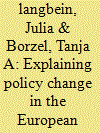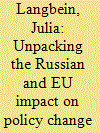| Srl | Item |
| 1 |
ID:
120677


|
|
|
|
|
| Publication |
2013.
|
| Summary/Abstract |
This Introduction discusses the conventional wisdoms dominating the scholarship on policy change in the EU's Eastern neighbourhood countries and summarises the major findings of this collection. Drawing upon the empirical evidence underpinning the contributions to our collection, we argue that compliance with or convergence to EU policies happens despite high costs, limited capacities and the lack of EU membership prospects. We also challenge country-level or policy-type explanations that emphasise membership aspirations, asymmetric interdependencies between the EU and the neighbourhood countries, or the level of politicisation or institutionalisation characterising particular policy fields. Finally, our findings point towards important differences between membership, accession and neighbourhood Europeanisation by stressing factors mediating the EU's impact on policy change in the Eastern neighbourhood countries that played a rather marginal role in domestic policy change in EU member states and accession countries.
|
|
|
|
|
|
|
|
|
|
|
|
|
|
|
|
| 2 |
ID:
120680


|
|
|
|
|
| Publication |
2013.
|
| Summary/Abstract |
Russia is usually considered as being obstructive to European integration in the EU's Eastern neighbourhood, while the EU is portrayed as being the key promoter of convergence with EU rules. Thus, strong economic dependence on Russia and EU active leverage should account for cross-policy variation in convergence with EU rules. By comparing convergence in Ukraine's telecommunications and food safety regulations, I show that active leverage exerted by Western European multinationals rather than by the EU accounts for divergent outcomes. Further, Russia's 'bad guy' image does not hold if we stop treating Russia as a unitary actor but distinguish between passive and active leverage exerted by Russian government policies, the Russian market and Russian multinationals investing in the Eastern neighbourhood countries on domestic policy choices.
|
|
|
|
|
|
|
|
|
|
|
|
|
|
|
|